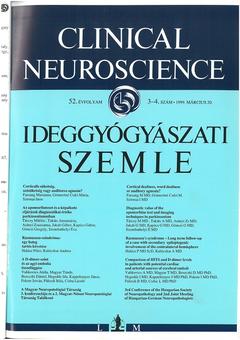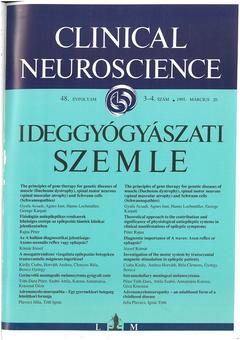Az eLitMed.hu orvostudományi portál a böngészés tökéletesítése érdekében cookie-kat használ.
Ha bővebb információkat szeretne kapni a cookie-k használatáról és arról, hogyan módosíthatja a beállításokat, kattintson ide: Tájékoztató az eLitMed.hu Cookie-használatáról.
Részletes keresés
Kérjük, állítsa be a paramétereket!
Találatok száma: 35
VAST (Valsartan plus hydrochlorothiazide versus Amlodipine in Stage II. hypertensive patients with additional risk factors)
Kezelés: A kéthetes bevezető szak alatt a betegek placebokezelésben részesültek. Ezt követően a betegeket három csoportba osztották: az első és második csoport tagjai napi 160 mg valsartant kaptak, a harmadik csoport betegei pedig napi 5 mg amlodipint, amelynek az adagját fokozatosan napi 10 mg dózisra titrálták.
A sclerosis multiplex diagnózisa, epidemiológiája, patomechanizmusának és terápiájának új szemlélete
Multiple sclerosis (MS) is an inflammatory demyelinating disease of unknown origin. It is the most common neurological disease among young Caucasian adults, primarily in women. The risk factors for MS include genetic and environmental influences. The diagnosis of MS is mainly clinical, based on the symptoms and clinical course of the disease.
A Free Radical Scenario ln Multiple Sclerosis
Multiple Sclerosis (MS) is a demyelinating disorder of the central nervous system (CNS) that has so far eluded auempts to determine it's cause. It could be that there isn't any one cause to determine. And so, as with many other multivariate nonlinear disorders, numerous epidemiological studies have been carried out to help identify possible modifying factors in the disease and the genetic linkages involved, not just to discover the etiology but also to help patients in need.
THE PRINCIPLES OF GENE THERAPY FOR GENETIC DISEASES OF MUSCLE (DUCHENNE DYSTROPHY), SPINAL MOTOR NEURONS (SPINAL MUSCULAR ATROPHY) AND SCHWANN CELLS (SCHWANNOPATHIES)
Gene replacement therapy using adenoviral vectors in genetic diseases of the motor unit is a potential treatment modality. ln preclinical experiments, promising results have been obtained by dystrophin minigene replacement in mdx mice. There are several serious problems that remain to be resolved (i. e. immunologically mediated elimination of transduced cells) before this approach can be used in human clinical trials.
1.
2.
3.
Ideggyógyászati Szemle Proceedings
Egészségügyi szakmai irányelv az akut ischaemiás stroke diagnosztikájáról és kezeléséről4.
5.
1.
2.
Klinikai Onkológia
Hasnyálmirigyrák: az ESMO klinikai gyakorlati irányelve a diagnózishoz, kezeléshez, követéshez*3.
Klinikai Onkológia
Gyógyszerbiztonsági szemelvények – a múlt tanulságai és a jövő lehetőségei4.
5.






